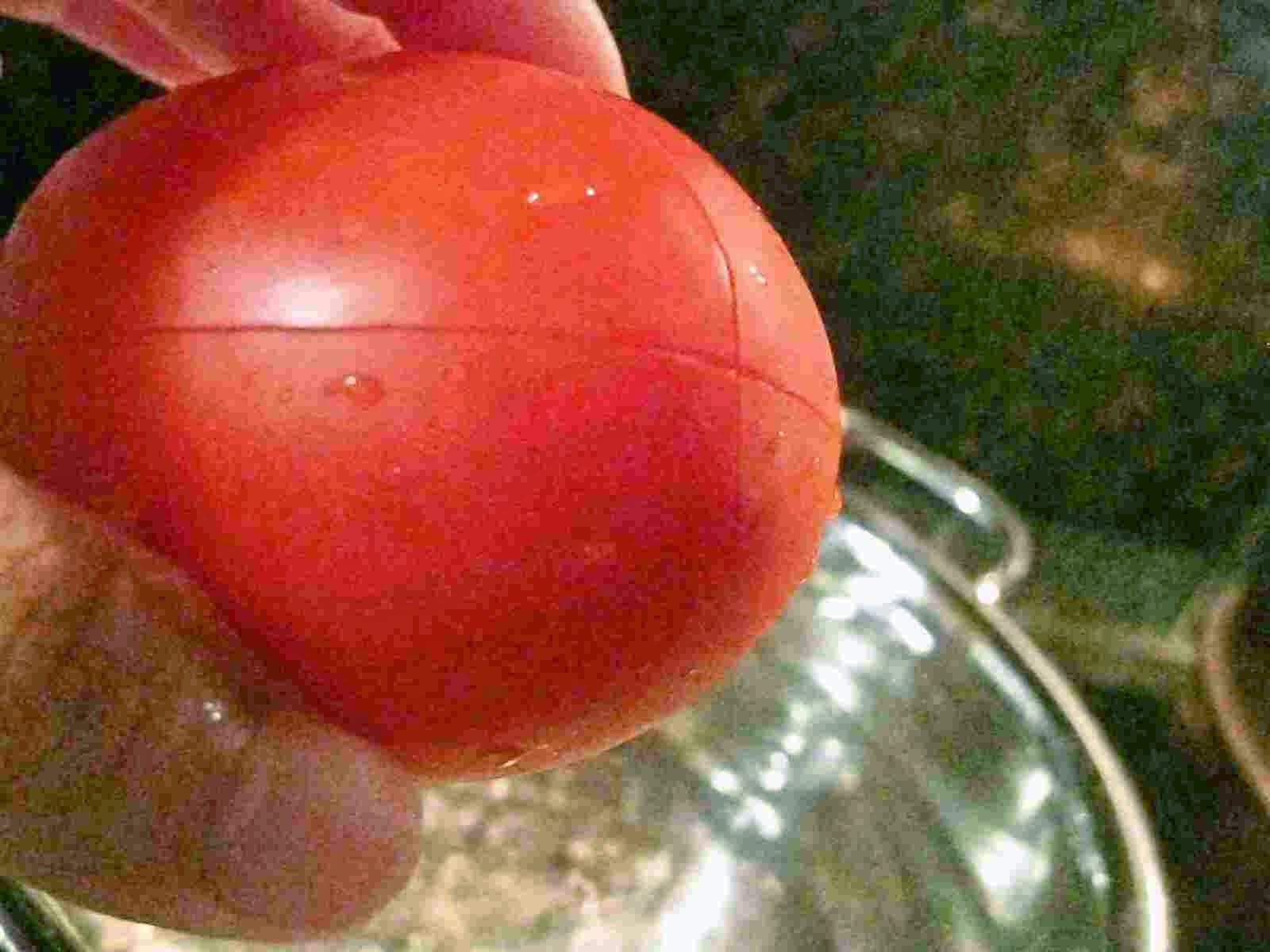Warabi's succulent texture pairs well with soba buckwheat noodles and ponzujoyu. As warabi needs a bit of time to absorb flavor, it is cooked in dressing for the quick fix below.
1/2 of recipe:
251 calories; 8.3 g protein; 5.4 g fat; 43.4 g carbohydrate; 39.4 g net carbs; 223 mg sodium (with ponzujoyu made with 50% reduced sodium soy sauce); 0 mg cholesterol; 4.0 g fiber
<Ingredients>
80-100 g dried soba buckwheat noodles (100 g in photo)
80-120 g warabi bracken (prepped; 115 g in photo)
1 tomato (128 g in photo)
Handful mizuna (48 g in photo)
1 taka no tsume red chili pepper (slices)
2 tsp olive oil
1 & 2/3 tbsp ponzujoyu citrus soy sauce
2 tbsp dashi
<Directions>
1.
Core tomato, make crisscross cut on surface, and boil for 30 seconds or so (roll with utensil if water does not cover tomato).
Transfer to ice water.
2.
Start boiling water to cook soba.
3.
Cut warabi and mizuna into 3-4cm.
Peel tomato, and dice.
4.
In a frying pan, heat olive oil, and saute warabi and taka no tsume for a few minutes.
Add tomato, and continue sauteing.
If lots of liquid comes out from tomato, raise heat to eliminate it.
Add ponzujoyu and dashi, and simmer for a few minutes.
Add mizuna (save some green sections for later), and mix.
When mizuna is done, immediately place frying pan in tray filled with ice water to cool.
5.
Boil soba as directed on package.
When done, drain, cool with water, and rub noodles between both palms until surface becomes smooth.
Rinse until water runs clear.
Drain well.
6.
In a mixing bowl, put soba, pour warabi dressing (everything in frying pan), and mix.
Add fresh mizuna, and mix.
Ready to serve.
<Notes>
1/2 of recipe:
251 calories; 8.3 g protein; 5.4 g fat; 43.4 g carbohydrate; 39.4 g net carbs; 223 mg sodium (with ponzujoyu made with 50% reduced sodium soy sauce); 0 mg cholesterol; 4.0 g fiber
<Ingredients>
80-120 g warabi bracken (prepped; 115 g in photo)
1 tomato (128 g in photo)
Handful mizuna (48 g in photo)
1 taka no tsume red chili pepper (slices)
2 tsp olive oil
1 & 2/3 tbsp ponzujoyu citrus soy sauce
2 tbsp dashi
<Directions>
1.
Core tomato, make crisscross cut on surface, and boil for 30 seconds or so (roll with utensil if water does not cover tomato).
Transfer to ice water.
2.
Start boiling water to cook soba.
3.
Cut warabi and mizuna into 3-4cm.
Peel tomato, and dice.
4.
In a frying pan, heat olive oil, and saute warabi and taka no tsume for a few minutes.
Add tomato, and continue sauteing.
If lots of liquid comes out from tomato, raise heat to eliminate it.
Add ponzujoyu and dashi, and simmer for a few minutes.
Add mizuna (save some green sections for later), and mix.
When mizuna is done, immediately place frying pan in tray filled with ice water to cool.
5.
Boil soba as directed on package.
When done, drain, cool with water, and rub noodles between both palms until surface becomes smooth.
Rinse until water runs clear.
Drain well.
6.
In a mixing bowl, put soba, pour warabi dressing (everything in frying pan), and mix.
Add fresh mizuna, and mix.
Ready to serve.
<Notes>
- Cooking mizuna is optional, especially if using tender greens. I cooked mizuna partly because it was tough and also to reduce the volume (in order to eat more mizuna in this dish).
- If mizuna (or mibuna) is not available, arugula (raw or blanched), watercress (raw or blanched), kabu turnip leaves (blanched) or daikon radish leaves (blanched) -- something with a soft punch -- would be a good choice.
- Make sure to let excess liquid from tomato evaporate before adding dashi and ponzujoju. Also, drain soba completely. Both are measures to prevent weakening the taste of dressing.
- This tastes good hot. Soba should be prepared in the same way as above, then quickly put in hot water to warm it up. When serving this hot, cut back on ponzujoyu to 1 tbsp. Because saltiness is sensed more clearly when the dish is hot, you need less salty seasoning compared to when serving it cold.
- If something slightly sweet (similar to soba dipping sauce, for example) is preferred, add 1/2-1 tsp mirin to warabi mixture.
- Store-bought ponzujoyu could easily double the sodium content above. If sodium intake is a concern, make your own -- it's as easy as mixing soy sauce of your choice and citrus juice (using a few kinds of citrus results in superior taste).


















No comments:
Post a Comment